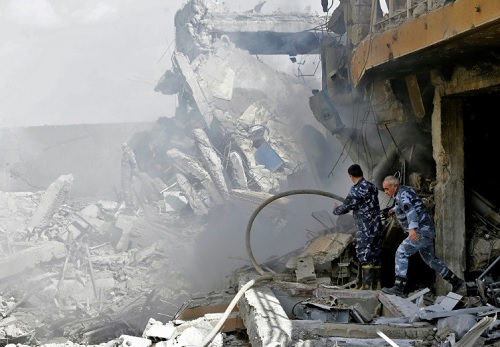The world's chemical weapons watchdog is set to convene Monday to discuss the suspected toxic gas assault in Syria that prompted an unprecedented wave of Western strikes, as its inspectors probe the attack near Damascus.
As the on-the-ground investigation gets under way, the fallout from the US-led response continued to reverberate, with French President Emmanuel Macron claiming to have persuaded President Donald Trump to keep his troops in Syria.
And in London, British Prime Minister Theresa May was to face an emergency parliamentary debate Monday over her country's part in the operation.
The US-led strikes were the biggest international attack on President Bashar al-Assad's regime since the start of Syria's seven-year war.
They have risked a confrontation with Moscow, the Syrian regime's top ally, with President Vladimir Putin warning that fresh attacks would spark "chaos", while Washington vowed economic sanctions against Russia rather than further military action.
US, French and British missiles destroyed sites suspected of hosting chemical weapons development and storage facilities Saturday, in a move lauded by President Donald Trump as "perfectly executed" -- although the buildings were mostly empty and both Damascus and Syria's opposition rubbished its impact.
The Western trio swiftly reverted to diplomatic efforts, with leaders facing flak at home over the punitive attack.
But their unified stance appeared to be shaken Sunday when Washington knocked back French President Emmanuel Macron's claim that Paris had convinced Trump to stay engaged in Syria "for the long-term".
White House spokeswoman Sarah Sanders said the US mission "has not changed" and Trump wanted troops home "as quickly as possible".
Saturday's strikes came just hours before a team of experts from the Organisation for the Prohibition of Chemical Weapons arrived in Damascus.
They have been tasked with investigating the site of the alleged April 7 chemical attack in the town of Douma, in the formerly rebel-held enclave of Eastern Ghouta, which Western powers said involved chlorine and sarin, and killed dozens.
The OPCW is set to meet in the Hague on Monday over the attack, although there have been no signs yet that the investigators have travelled to Douma to begin their fieldwork.
The inspectors will face a difficult task, with all key players having pre-empted their findings, including Western powers, which justified the strikes by claiming they already had proof such weapons were used.
Inspection still useful? -
The team will also have to deal with the risk that evidence may have been removed from the site, which lies in an area that has been controlled by Russian military police and Syrian forces over the past week.
"That possibility always has to be taken into account, and investigators will look for evidence that shows whether the incident site has been tampered with," Ralf Trapp, a consultant and member of a previous OPCW mission to Syria, told AFP.
(AFP)

Syrian soldiers inspect the wreckage of a building described as part of the Scientific Studies and Research Centre (SSRC) compound in the Barzeh district, north of Damascus, on April 14, 2018
Leave Comments